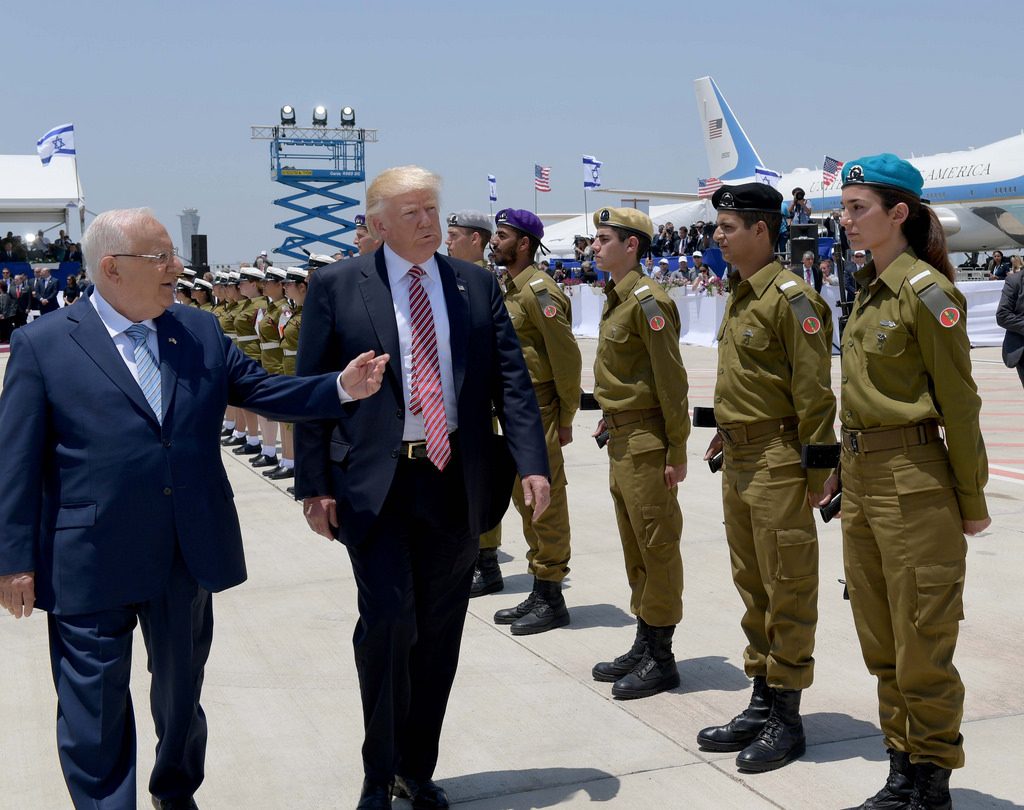IN THE MEDIA
Trump should encourage a more conciliatory Palestinian leadership
October 3, 2018 | Colin Rubenstein

An edited version of this article appeared in The Age on Monday, October 1, 2018.
There have been important considerations missing from much discussion of the Trump Administration’s recent moves regarding Israel and the Palestinians. For example, there is little comment about whether the behaviour of the Palestinian leadership in any way warrants Trump’s seemingly harder line, whether the moribund peace process needs to be shaken up and if so, whether Trump’s moves may actually be productive.
Palestinians and their supporters worry that Trump’s so-called “ultimate deal” may give the Palestinians less than they have previously been offered. However, offers providing the Palestinian leadership what they claim to want have failed to lead to peace, or even further negotiation, so clearly a new approach is warranted.
We know that Israeli offers of Palestinian statehood are not what has been lacking. Israeli Prime Minister Ehud Barak working with Bill Clinton in 2000, and early 2001, offered the Palestinians statehood in Gaza and the vast majority of the West Bank. Instead of leading to peace, the terrorist second Intifada broke out – which saw over 1000 Israelis murdered and many Palestinians also losing their lives.
In 2008, PM Ehud Olmert offered Palestinian Authority (PA) President Mahmoud Abbas a Palestinian state in all of Gaza, almost all of the West Bank, with land from inside Israel making up the balance, a land bridge between the West Bank and Gaza, a Palestinian capital in east Jerusalem, Palestinian control over Muslim holy sites and a limited return of Palestinian refugees, with a financial settlement for the rest. This was all that the PA had claimed to want, yet, as he admitted in 2015, Abbas rejected the offer “out of hand”.
Meanwhile, in 2005, Israeli PM Ariel Sharon unilaterally withdrew Israeli soldiers and settlers from Gaza, but Israel then saw a Hamas takeover, thousands of rocket and mortar attacks, terror tunnels, three wars and, lately, hundreds of arson attacks. It is not reasonable to expect any similar experiment to be repeated in the West Bank.
More recently, since Benjamin Netanyahu became PM in 2008, Abbas has refused to genuinely negotiate despite Israeli confidence building measures such as freezing building in settlements and releasing Palestinian prisoners who had killed Israelis. US envoy Martin Indyk has said that in 2014, Netanyahu was “sweating bullets” to make peace. Yet Abbas just walked away from those talks. Since then, Abbas has refused to negotiate at all.
Now, the PA has announced it is going to reject Trump’s deal, despite not even knowing what it entails.
The relocation of the US Embassy to Jerusalem has been criticised, but no-one questions that Israel will retain west Jerusalem in any peace deal, with Trump making it clear that the move does not preclude a Palestinian capital in east Jerusalem. Many support the logic that the discrimination against Israel, whereby it’s the only country not entitled to nominate its own capital on its own territory, should be rejected, and that the Palestinians be encouraged to understand that their intransigence will not stop Israel being treated normally.
US defunding of the United Nations Relief and Works Agency (UNRWA), which looks exclusively after Palestinian refugees and their descendants, is also controversial. However, those attacking the move should explain why it is only with Palestinian refugees that the descendants of those who fled are also treated as refugees, leading to at most 800,000 original refugees becoming more than five million, and why they have their own agency when the rest of the world’s refugees are supported by the UN High Commission for Refugees (UNHCR). Furthermore, why again are Palestinians uniquely still considered refugees even when they have citizenship of another country, like Jordan, or are living in areas such as Gaza and the West Bank, essentially ruled by their own people.
Basically UNRWA is perpetuating the Palestinian refugee issue, and the aspiration for a “return” to Israel, which would mean the end of Israel as a state for the Jewish people, an objective that is therefore completely incompatible with a peace based on two states for two peoples.
Trump has also been attacked for cutting funding to the PA, but that is to try to stop the PA encouraging terrorism by paying generous pensions to Palestinians jailed for terrorist acts, or to their families if they’re killed in the act. For example, when Israeli Ari Fuld was stabbed in the back and murdered on September 16, the PA immediately moved to pay a pension to the family of the 17-year-old killer.
Closing the PLO office in Washington DC drew similar criticism, but Trump was legally required to do so under laws passed during the Obama presidency that provide that unless peace talks are occurring (they are not), the office must be closed if the PLO attempts (as they are) to take Israel to the International Criminal Court.
Many of the Trump Administration’s moves on the international stage may be questionable, but when there is no sign of progress between Israelis and Palestinians 25 years after the promising Oslo Accords, and when the Palestinian side is openly refusing to negotiate, pandering to them while penalizing Israel is not only unjust, but counterproductive towards kick-starting much needed negotiations towards a two state outcome.
Trump is right to encourage the emergence of a more conciliatory Palestinian leadership accountable for its own behaviour in his attempt to break through the current impasse – with the goal of indeed renewing the two-state negotiating process that has been stalled for almost a decade.
Dr Colin Rubenstein is executive director of the Australia/Israel & Jewish Affairs Council and previously taught Middle East Politics at Monash University.
Tags: Israel, Palestinians, UNRWA, United States





